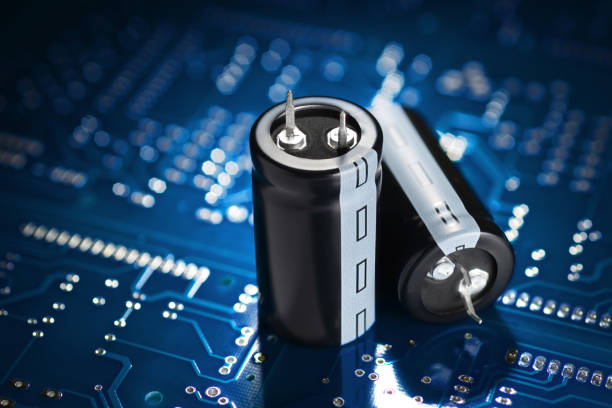Capacitor for AC Unit: Understanding its Importance and Functionality
Air conditioning units are essential in keeping our homes and offices cool and comfortable during hot weather. These systems rely on various components to function efficiently, including the capacitor. The capacitor is a small but crucial part of the AC unit that plays a significant role in its operation. In this article, we will discuss the importance of the capacitor in an AC unit, how it works, and when it needs to be repla
What is a Capacitor?A capacitor is an electrical component that stores energy in an electric field. It consists of two metal plates separated by an insulating material called a dielectric. When a voltage is applied to the capacitor, an electric charge builds up on the plates, creating an electric field between them. The amount of energy that a capacitor can store is measured in farads (F).The Role of Capacitor in an AC Unit In an AC unit, the capacitor is responsible for providing the initial boost of power required to start the compressor and fan motors. The compressor motor is responsible for compressing the refrigerant gas, while the fan motor circulates the air through the system. Without a functioning capacitor, the motors would not have enough power to start, and the AC unit would not work.
Types of Capacitors Used in AC Units
There are two types of capacitors used in AC units: start capacitors and run capacitors. Start capacitors provide the initial boost of power required to start the compressor and fan motors. They have a higher capacitance value than run capacitors and are only used for a short period during startup. Run capacitors, on the other hand, provide a continuous supply of power to keep the motors running. They have a lower capacitance value than start capacitors and are designed to operate for longer periods.
Signs of a Failing Capacitor
Like any other component in an AC unit, capacitors can fail over time. Some signs of a failing capacitor include:
1. AC unit not turning on or taking longer to start
2. AC unit making strange noises during operation
3. AC unit not cooling the room as effectively as before
4. AC unit shutting off on its own
If you notice any of these signs, it’s essential to have your AC unit inspected by a professional technician. They can diagnose the problem and determine if the capacitor needs to be replaced.
Replacing a Capacitor
Replacing a capacitor is a relatively simple process that can be done by a professional technician. The first step is to turn off the power to the AC unit to avoid any electrical shocks. The technician will then remove the old capacitor and install a new one. It’s important to use the correct type of capacitor for your AC unit to ensure proper operation.
Conclusion
In conclusion, the capacitor is a small but crucial component of an AC unit that plays a significant role in its operation. It provides the initial boost of power required to start the compressor and fan motors, allowing the AC unit to function efficiently. If you notice any signs of a failing capacitor, it’s essential to have your AC unit inspected by a professional technician to avoid any further damage. Regular maintenance and inspection of your AC unit can help prevent capacitor failure and prolong the life of your system.
Air conditioning units are essential in keeping our homes and offices cool and comfortable during hot weather. These systems rely on various components to function efficiently, including the capacitor. The capacitor is a small but crucial part of the AC unit that plays a significant role in its operation. In this article, we will discuss the importance of the capacitor in an AC unit, how it works, and when it needs to be replaced.
What is a Capacitor?
A capacitor is an electrical component that stores energy in an electric field. It consists of two metal plates separated by an insulating material called a dielectric. When a voltage is applied to the capacitor, an electric charge builds up on the plates, creating an electric field between them. The amount of energy that a capacitor can store is measured in farads (F).
The Role of Capacitor in an AC Unit
In an AC unit, the capacitor is responsible for providing the initial boost of power required to start the compressor and fan motors. The compressor motor is responsible for compressing the refrigerant gas, while the fan motor circulates the air through the system. Without a functioning capacitor, the motors would not have enough power to start, and the AC unit would not work.
Types of Capacitors Used in AC Units
There are two types of capacitors used in AC units: start capacitors and run capacitors. Start capacitors provide the initial boost of power required to start the compressor and fan motors. They have a higher capacitance value than run capacitors and are only used for a short period during startup. Run capacitors, on the other hand, provide a continuous supply of power to keep the motors running. They have a lower capacitance value than start capacitors and are designed to operate for longer periods.
Signs of a Failing Capacitor
Like any other component in an AC unit, capacitors can fail over time. Some signs of a failing capacitor include:
1. AC unit not turning on or taking longer to start
2. AC unit making strange noises during operation
3. AC unit not cooling the room as effectively as before
4. AC unit shutting off on its own
If you notice any of these signs, it’s essential to have your AC unit inspected by a professional technician. They can diagnose the problem and determine if the capacitor needs to be replaced.
Replacing a Capacitor
Replacing a capacitor is a relatively simple process that can be done by a professional technician. The first step is to turn off the power to the AC unit to avoid any electrical shocks. The technician will then remove the old capacitor and install a new one. It’s important to use the correct type of capacitor for your AC unit to ensure proper operation.
Conclusion
In conclusion, the capacitor is a small but crucial component of an AC unit that plays a significant role in its operation. It provides the initial boost of power required to start the compressor and fan motors, allowing the AC unit to function efficiently. If you notice any signs of a failing capacitor, it’s essential to have your AC unit inspected by a professional technician to avoid any further damage. Regular maintenance and inspection of your AC unit can help prevent capacitor failure and prolong the life of your system.


